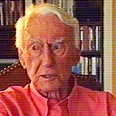
Former MI chief Binyamin Gibli dies
Forced to step down following Lavon Affair in mid-50's, the 89-year-old went on to number of high-profile positions in business sector
Former Military Intelligence chief, Col. Binyamin Gibli (res), died on Tuesday afternoon in Tel Aviv at the age of 89. His funeral will apparently be scheduled for Wednesday.
"He gave a lot for the country, he fought for it since he was very young," his brother, Avshalom Gibli, told Ynet.
Col. Gibli was one of the highest ranking figures in the scandal that came to be knows as the 'Lavon Affair.' Israel was at war with Egypt when it hatched a plan in 1954 to ruin its rapprochement with the United States and Britain by firebombing sites frequented by foreigners in Cairo and Alexandria.
But Israeli hopes the attacks, which caused no casualties, would be blamed on local insurgents collapsed when the young Jewish-Egyptian bombers were caught and confessed at public trials. Two were hanged. The rest served jail terms and emigrated to Israel.
The question of who gave the order to launch the rogue operation is still a matter of much contention among historians – but Gibli was named as possibly having acted alone, without informing then-chief of staff, Moshe Dayan.
The storm that followed the Lavon Affair (so named after the minister of defense at the time, Pinchas Lavon – who resigned in the wake of the scandal) eventually led Gibli to step down.
Avshalom said the Lavon Affair haunted his brother till his dying day. "He was burdened with it. Sometimes he felt guilty for (David) Ben-Gurion's abandonment. But he didn't talk about it, and didn't want to be reminded of it. As far as he was concerned – it was done with, and that was that."
After being discharged from the army, Gibli turned to the business sector and filled a series of high-profile positions, including as chairman of the Israeli Electric Corporation in the 1980s.
'The Tobianski trial haunted him'
But the Lavon Affair was not the only blight on Gibli's record. In 1948 Gibli was one of three officers who convicted Meir Tobianski of espionage during the War of Independence in a drumhead court-martial.
Tobianski was sentenced to death and promptly executed, the only execution in Israeli history other than that of Adolph Eichmann in 1962.
Tobianski was posthumously exonerated, and completely cleared of all wrongdoing.
Avshalom said the affair haunted his brother. "He was accused of having been both judge and executioner. It ate him from within. Once he told me, with much pain – 'Why didn't they get to the bottom of the investigation?'"
Avshalom said Gibli had been healthy until recently, when he fell ill with a virus. "The last time we talked was a month ago, when he came to visit me. He was grinning, you couldn't tell he was about to die. With him you could never know what was going to happen."










